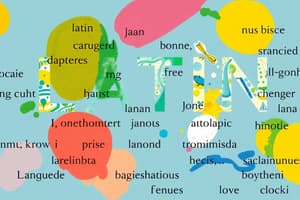Podcast
Questions and Answers
What is the main focus of the discipline 'Stylistics'?
What is the main focus of the discipline 'Stylistics'?
Forming communication skills and competencies related to language usage and etiquette.
Which of the following competencies are targeted in the study of 'Stylistics'? (Select all that apply)
Which of the following competencies are targeted in the study of 'Stylistics'? (Select all that apply)
- Using etiquette formulas in oral and written communication (correct)
- Utilizing language-specific elements effectively
- Understanding sociocultural features in English communication (correct)
- Applying lexical content in etiquette formulas (correct)
The discipline of 'Stylistics' emphasizes the importance of using _______ in various forms of communication.
The discipline of 'Stylistics' emphasizes the importance of using _______ in various forms of communication.
etiquette formulas
What is one of the aspects related to linguistic equivalency mentioned in the content?
What is one of the aspects related to linguistic equivalency mentioned in the content?
What is one of the key skills required for written translation mentioned in the content?
What is one of the key skills required for written translation mentioned in the content?
Ethical norms and rules of conduct for a translator are discussed in the context of oral ____________.
Ethical norms and rules of conduct for a translator are discussed in the context of oral ____________.
Match the following: Skills to Written Translation
Match the following: Skills to Written Translation
What is the main focus of the language proficiency described in this text?
What is the main focus of the language proficiency described in this text?
The proficiency level 'Владение' includes skills in conducting comparative analysis of original and translated _____ (text)
The proficiency level 'Владение' includes skills in conducting comparative analysis of original and translated _____ (text)
One of the objectives of proficiency level 'Способность' is to determine the similarity and difference in formal means of expressing themes and rhemes in native and foreign languages.
One of the objectives of proficiency level 'Способность' is to determine the similarity and difference in formal means of expressing themes and rhemes in native and foreign languages.
The object of stylistics is...
The object of stylistics is...
Expressive means are...
Expressive means are...
Slang is...
Slang is...
What is one of the skills listed under 'Vladet (V)' related to evaluation and solving of problems?
What is one of the skills listed under 'Vladet (V)' related to evaluation and solving of problems?
Under 'Vladet (V),' what skill involves the basics of simultaneous translation?
Under 'Vladet (V),' what skill involves the basics of simultaneous translation?
What is a skill related to sequential and escort translation under 'Vladet (V)'?
What is a skill related to sequential and escort translation under 'Vladet (V)'?
What is one of the skills associated with 'Vladenie (V)' involving the application of etiquette formulas in oral and written communication?
What is one of the skills associated with 'Vladenie (V)' involving the application of etiquette formulas in oral and written communication?
Under 'Vladenie (V),' what skill includes the application of etiquette formulas in communication for greetings, farewells, congratulations, apologies, and requests?
Under 'Vladenie (V),' what skill includes the application of etiquette formulas in communication for greetings, farewells, congratulations, apologies, and requests?
One of the skills under 'Vladenie (V)' involves organizing translations for accompanying tourist groups according to international etiquette rules. What is this skill?
One of the skills under 'Vladenie (V)' involves organizing translations for accompanying tourist groups according to international etiquette rules. What is this skill?
What is a skill related to 'Umiet (U)' that involves utilizing etiquette formulas in oral and written communication for greetings, farewells, congratulations, apologies, and requests?
What is a skill related to 'Umiet (U)' that involves utilizing etiquette formulas in oral and written communication for greetings, farewells, congratulations, apologies, and requests?
Under 'Umiet (U),' what skill involves effectively applying etiquette formulas in oral and written communication in native and studied languages?
Under 'Umiet (U),' what skill involves effectively applying etiquette formulas in oral and written communication in native and studied languages?
What is a skill under 'Umiet (U)' that focuses on arranging translations for accompanying tourist groups in line with international etiquette rules and norms?
What is a skill under 'Umiet (U)' that focuses on arranging translations for accompanying tourist groups in line with international etiquette rules and norms?
What is the recognized term for a group of words with entirely new meanings imposed on them, existing in almost every language, whose aim is to preserve secrecy within one or another social group?
What is the recognized term for a group of words with entirely new meanings imposed on them, existing in almost every language, whose aim is to preserve secrecy within one or another social group?
Morphological or partial archaisms are antiquated or obsolete words replaced by new ones. What is the primary function of archaic forms of otherwise non-archaic words?
Morphological or partial archaisms are antiquated or obsolete words replaced by new ones. What is the primary function of archaic forms of otherwise non-archaic words?
What are the words of foreign origin that have not been entirely assimilated into the English language called?
What are the words of foreign origin that have not been entirely assimilated into the English language called?
Archaisms are...
Archaisms are...
The definition of "these are expletives and swear words which are of an abusive character, obscene words like "damn", "bloody" etc" is appropriate for...
The definition of "these are expletives and swear words which are of an abusive character, obscene words like "damn", "bloody" etc" is appropriate for...
Obsolete words are...
Obsolete words are...
A language's word-stock can be roughly divided into which categories?
A language's word-stock can be roughly divided into which categories?
What is the biggest division of vocabulary?
What is the biggest division of vocabulary?
Where can literary words be found?
Where can literary words be found?
What is considered the main source of synonymy and polysemy?
What is considered the main source of synonymy and polysemy?
Special literary words are constituted by which elements?
Special literary words are constituted by which elements?
Flashcards are hidden until you start studying
Study Notes
Stylistics Discipline
- The discipline "Stylistics" is part of the educational program "Translation and Interpreting" (code 45.05.01)
- The discipline aims to develop the following competencies:
- The ability to use etiquette formulas in oral and written communication
- The ability to understand the social and cultural aspects of communication
- The ability to apply etiquette formulas in different communication situations
Learning Outcomes
- Students will be able to:
- Know the repertoire of etiquette formulas in oral and written communication
- Understand the socio-cultural aspects of communication in English
- Apply etiquette formulas in oral and written communication
- Realize the language and speech means of communication in different forms
- Identify and determine verbal and non-verbal means of communication in typical communication situations
Competencies
- Professional competence (ОПК-10):
- Ability to use etiquette formulas in oral and written communication
- Ability to understand the socio-cultural aspects of communication
- Ability to apply etiquette formulas in different communication situations
- Universal competencies:
- Ability to know and understand the repertoire of etiquette formulas
- Ability to understand the socio-cultural aspects of communication
- Ability to apply etiquette formulas in oral and written communication### Translation Competence
- Ability to translate written texts with adherence to grammatical, syntactical, and stylistic norms
- Knowledge of morphological, syntactical, and lexical features of the Russian language and their equivalents in the target language
- Understanding of the principles of development of the Russian language and its comparison with the target language
Professional Translation Competence
- Ability to choose the overall translation strategy with consideration of pragmatic settings and text type
- Knowledge of official-business style, its features, and transmission methods in the target language
- Understanding of the basic terms of international business, business contacts, and their correspondence in the target language
Ethical Competence in Written Translation
- Knowledge of ethical norms and rules of behavior for translators working in written translation
- Understanding of the principles of translation ethics, including social, cultural, and professional requirements
- Ability to apply ethical principles in written translation, taking into account the context and purpose of the text
Ethical Competence in Oral Translation
- Knowledge of ethical norms and rules of behavior for translators working in oral translation
- Understanding of the principles of translation ethics, including social, cultural, and professional requirements
- Ability to apply ethical principles in oral translation, taking into account the context and purpose of the communication
International Etiquette and Behavioral Rules
- Knowledge of international etiquette and behavioral rules in different cultural and social contexts
- Understanding of the principles of international communication, including protocols, rules, and norms of behavior
- Ability to apply international etiquette and behavioral rules in oral translation, ensuring effective communication and avoiding cultural misunderstandings### Language Competence
- Possesses language competence, which includes:
- Ability to use etiquette formulas in oral and written communication
- Ability to adequately apply etiquette formulas in oral and written communication
- Ability to organize translation for accompanying a tourist group, considering international etiquette rules and norms
Knowledge
- Knows:
- Basic positions related to linguistics (З13)
- Basics of theory of communication and stylistics of text (З14)
- Basics of interpretation of language units and speech (З15)
Ability to Analyze
- Can:
- Conduct comparative analysis of original and translated texts (У13)
- Analyze language units and speech (У14)
- Interpret language units and speech (У15)
Mastery
- Possesses:
- Skills to conduct comparative analysis of original and translated texts (В13)
- Skills to analyze language units and speech (В14)
- Skills to interpret language units and speech (В15)
Ability to Operate
- Can:
- Operate with complex elements of text, defining full or partial coincidence of lexical unit meanings (У16)
- Fix relationships of lexical non-equivalence styles (У17)
- Determine similarity and difference in formal means of theme and rheme expression in native and foreign languages (У18)
Mastery
- Possesses:
- Skills to operate with complex elements of text, defining full or partial coincidence of lexical unit meanings (В16)
- Skills to fix relationships of lexical non-equivalence styles (В17)
- Skills to determine similarity and difference in formal means of theme and rheme expression in native and foreign languages (В18)
Discursive Competence
- Possesses discursive competence, which manifests in the ability to adequately convey communicative-functional content of the original material using equivalent means of the translating language (ПСК-4)
- Knows:
- Basic positions related to understanding language as a system and its structural components (З19)
- Basics of theory of communication and stylistics of text (З20)
- System of means of translating language (З21)
Studying That Suits You
Use AI to generate personalized quizzes and flashcards to suit your learning preferences.




